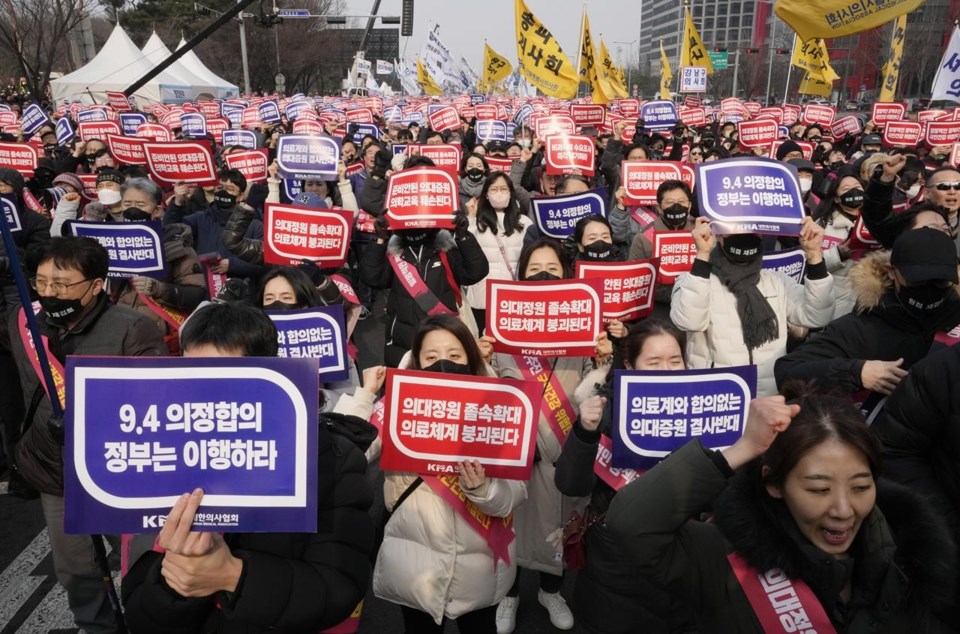SEOUL, South Korea (AP) — Thousands of senior doctors rallied in the South Korean capital, Seoul, on Sunday to express their support for junior doctors who have been on strike for nearly two weeks over a government plan to sharply increase the number of medical school admissions.
The rally came as the government said it would begin to take steps Monday to suspend the doctors' licenses of nearly 9,000 medical interns and residents for defying government orders to end their walkouts, which have disrupted hospital operations.
“The government’s absurd medical policy has triggered immense resistance by trainee doctors and medical students, and we doctors have become one,” Park Sung-min, a senior member of the Korea Medical Association, said in a speech at the rally. “I’m asking the government: Please, stop the threats and suppression now.”
Protesters chanted slogans, sang and held placards criticizing the government’s plan. There were were no reports of violence.
As of Thursday night, 8,945 of the country’s 13,000 medical interns and residents were confirmed to have left their worksites, according to the Health Ministry. The government had said they would face minimum three-month license suspensions and indictments by prosecutors if they didn’t return by Feb. 29.
The striking doctors are a fraction of South Korea’s 140,000 doctors. But they account for 30-40% of the total doctors at some major hospitals, where they assist senior doctors during surgeries and other treatments while training. Their walkouts have subsequently caused numerous cancellations of surgeries and medical treatments at the hospitals.
Senior doctors have staged a series of rallies backing the young doctors but haven't joined the walkouts. If they also launch strikes, observers say that would be a major blow to South Korea's medical service. Prime Minister Han Duck-soo on Sunday urged senior doctors to persuade the striking junior doctors to return to work.
Police said they were investigating five ranking Korea Medical Association officials accused of inciting and abetting the junior doctors' walkouts. Seoul police chief Cho Ji-ho told reporters Sunday that police had raided KMA offices as part of the investigation.
The government wants to increase South Korea’s medical school enrollment quota by 2,000 starting next year, from the current 3,058, to better deal with the country’s rapidly aging population. Officials say South Korea’s doctor-to-population ratio is one of the lowest among developed countries.
But many doctors have vehemently protested the plan, saying medical schools can’t handle such a sharp increase in the number of students. They say the recruitment plan also does not address a chronic shortage of doctors in essential but low-paying specialties like pediatrics and emergency departments. Doctors say adding too many new doctors would also increase public medical expenses since greater competition would lead to excess treatments.
Without concrete plans on how to educate the newly added students, “the quality of medical education will plunge endlessly, resulting in a unsafe, low-quality medical service and eventually a collapse of the medical service of the Republic of Korea,” Lee Jeong-geun, acting leader of the Korea Medical Association, said at the rally.
The protests by doctors haven't won public support, with a survey showing a majority of South Koreans support the government plan. Some critics say doctors — one of the best-paid professions in South Korea — simply worry about receiving a lower income due to the rising number of doctors.
Hyung-jin Kim, The Associated Press




